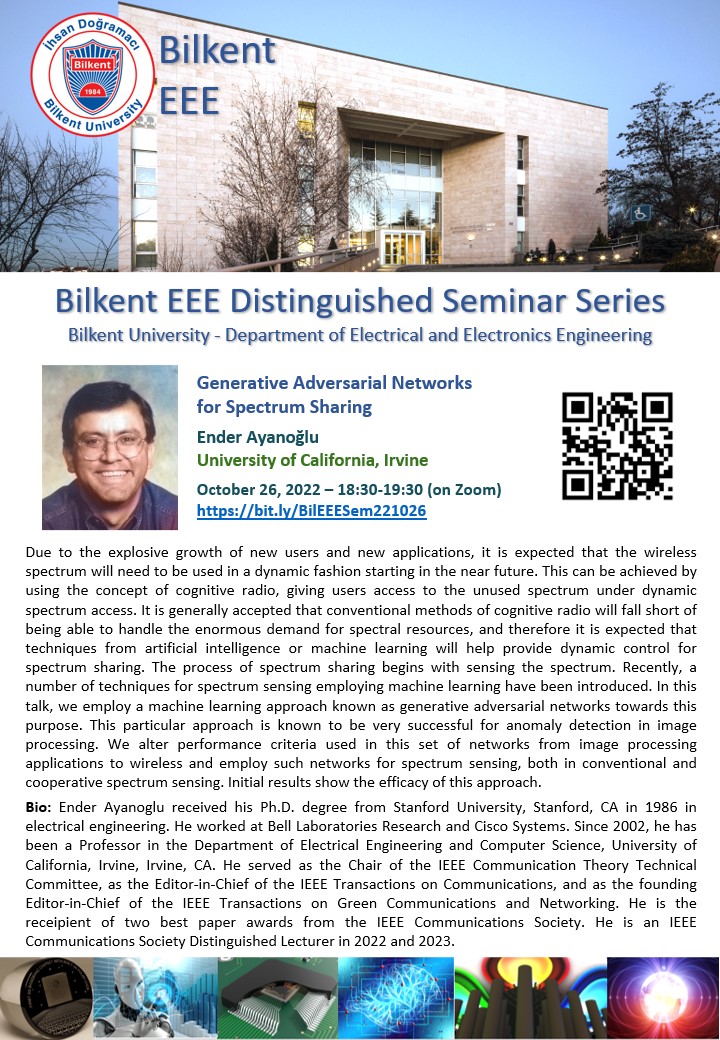
Ender Ayanoğlu
University of California, Irvine
Date/Time: October 26, 2022, 18:30-19:30
Generative Adversarial Networks for Spectrum Sharing
Due to the explosive growth of new users and new applications, it is expected that the wireless spectrum will need to be used in a dynamic fashion starting in the near future. This can be achieved by using the concept of cognitive radio, giving users access to the unused spectrum under dynamic spectrum access. It is generally accepted that conventional methods of cognitive radio will fall short of being able to handle the enormous demand for spectral resources, and therefore it is expected that techniques from artificial intelligence or machine learning will help provide dynamic control for spectrum sharing. The process of spectrum sharing begins with sensing the spectrum. Recently, a number of techniques for spectrum sensing employing machine learning have been introduced. In this talk, we employ a machine learning approach known as generative adversarial networks towards this purpose. This particular approach is known to be very successful for anomaly detection in image processing. We alter performance criteria used in this set of networks from image processing applications to wireless and employ such networks for spectrum sensing, both in conventional and cooperative spectrum sensing. Initial results show the efficacy of this approach.
Bio: Ender Ayanoglu received his Ph.D. degree from Stanford University, Stanford, CA in 1986 in electrical engineering. He was with the Communications Systems Research Laboratory, Holmdel, NJ, part of AT&T Bell Laboratories until 1996, and Bell Labs, Lucent Technologies from 1996 until 1999. During 1999-2002, he was a Systems Architect at Cisco Systems, Inc., San Jose, CA. Since 2002, he has been a Professor in the Department of Electrical Engineering and Computer Science, University of California, Irvine, Irvine, CA, where he served as the Director of the Center for Pervasive Communications and Computing and held the Conexant-Broadcom Endowed Chair during 2002-2010. His past accomplishments include invention of the 56K modems, characterization of wavelength conversion gain in Wavelength Division Multiplexed (WDM) systems, and diversity coding. 56K modems broke what was believed to be the “Shannon limit” of about 36 kb/s for voiceband modems. Since every laptop computer includes one, the number of implementations of 56K modems is estimated to be in the hundreds of millions or even billions. His work on wavelength conversion gain in WDM networks showed large gains can be achieved via better wavelength selection and routing algorithms without the need for optical wavelength converters. And, diversity coding is a technique for link failure recovery in communication networks employing erasure coding introduced in 1990, prior to the publication of the first papers on network coding. During 2000-2001, Dr. Ayanoglu served as the founding chair of the IEEE-ISTO Broadband Wireless Internet Forum (BWIF), an industry standards organization which developed and built a broadband wireless system employing Orthogonal Frequency Division Multiplexing (OFDM) and a Medium Access Control (MAC) algorithm that provides Quality-of-Service (QoS) guarantees. From 1990 to 2002, Dr. Ayanoglu served on the Executive Committee of the IEEE Communications Society Communication Theory Committee, and from 1999 to 2001, was its Chair. From 1993 until 2014 he was an Editor, and since January 2014 is a Senior Editor of the IEEE Transactions on Communications. He served as the Editor-in-Chief of the IEEE Transactions on Communications from 2004 to 2008. From December 2014 until June 2020, he served as the Editor-in-Chief of IEEE Journal on Selected Areas in Communications – Series on Green Communications and Networking and as the founding Editor-in-Chief of the new journal IEEE Transactions on Green Communications and Networking. Dr. Ayanoglu is the recipient of the IEEE Communications Society Stephen O. Rice Prize Paper Award in 1995 and the IEEE Communications Society Best Tutorial Paper Award in 1997. He received the IEEE Communications Society Communication Theory Technical Committee Outstanding Service Award in 2014. He has been an IEEE Fellow since 1998. He is an IEEE Communications Society Distinguished Lecturer from January 2022 until January 2024.